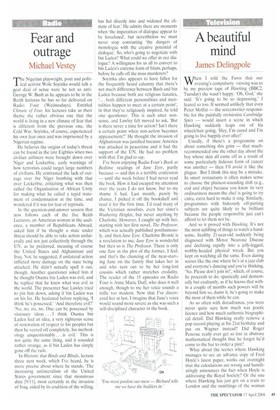Fear and outrage
Michael Vestey
The Nigerian playwright, poet and political activist Wole Soyinka would talk a geat deal of sense were he not so antiGeorge W. Bush as he appears to be in the Reith lectures he has so far delivered on Radio Four (Wednesdays). Entitled Climate of Fear, his lectures take as their theme the rather obvious one that the world is living in a new climate of fear that is different from the previous one, the Cold War. Soyinka, of course, experienced his own fear once and was imprisoned by a Nigerian regime.
He believes the origins of today's threat can be found in the late Eighties when two civilian airliners were brought down over Niger and Lockerbie, early warnings of how terrorists could target large numbers of civilians. He contrasted the lack of outrage over the Niger bombing with that over Lockerbie. criticising what was then called the Organisation of African Unity for making what he called a tepid statement of condemnation at the time, and wondered if it was for fear of reprisals.
In the question-and-answer session that now follows each of the five Reith Lectures. an American woman in the audience, a member of Republicans Abroad, asked him if he thought a state under threat should be able to take action unilaterally and not just collectively through the UN, as he preferred, meaning of course the United States and Afghanistan and Iraq. Not, he suggested, if unilateral action inflicted more damage on the state being attacked. He didn't actually spell it out, though. Another questioner asked him if he thought Osama bin Laden was evil, and he replied that he knew what was evil in the world. The presenter Sue Lawley tried to pin him down, asking if bin Laden was on his list. He hesitated before replying, 'I think he's possessed.' And therefore evil?' 'No, no, no, no. One can be possessed by visionary ideas ... I think Osama bin Laden had an idea, a very righteous sense of restoration of respect to his peoples but then he veered off completely, his methodology unquestionably. ... is evil.' This is not quite the same thing, and it sounded rather strange, as if bin Laden has simply gone off the rails.
In Rhetoric that Binds and Blinds, lecture three next week, which I've heard, he is more precise about where he stands, 'The increasing unilateralism of the United States government since that monstrous date [9/11], most certainly in the invasion of Iraq, aided by its coalition of the willing, has fed directly into and widened the climate of fear.' He admits there are moments when 'the imperatives of dialogue appear to be foreclosed', but nevertheless we must never stop contrasting 'the dangers of monologue with the creative potential of dialogue'. So, who's going to negotiate with bin Laden? What could we offer in our dialogue? A willingness for us all to convert to bin Laden's extreme form of Islam, perhaps, before he calls off the mass murderers?
Soyinka also appears to have fallen for the frequently heard calumny that there's not much difference between Bush and bin Laden because both are religious fanatics, both different personalities and mentalities happen to meet at a certain point', in that they're religiously inspired, he told one questioner. This is such utter nonsense. and Lawley felt moved to ask, 'But is there never a time for action? Isn't there a certain point when non-action becomes appeasement?' He thought the invasion of Afghanistan was justified because America was attacked in peacetime and it had the support of the UN. He had no problem with that. I'm glad to say.
I've been enjoying Radio Four's Book at Bedtime readings of Jane Eyre, partly because — and this is a terrible confession — until the week before I had never read the book. How it had escaped my attention over the years I do not know, but to my shame it had. Last month, purely by chance, I picked it off the bookshelf and read it for the first time. I'd read many of the Victorian novelists, even her sister's Wuthering Heights, but never anything by Charlotte. However, I caught up with her, starting with her first novel, The Professor, which was actually published posthumously, and then Jane Eyre. Charlotte Brontë is a revelation to me; Jane Eyre is wonderful but then so is The Professor. There is only one flaw in the plot of the former, I feel, and that's the chancing of the near-starving Jane on the family that takes her in and who turn out to be her long-lost cousins which rather stretches credulity. The reader of the 15 episodes on Radio Four is Anne Marie Duff, who does it well enough, though to me her voice sounds a trifle too modern. Now that I've discovered her at last, I imagine that Jane's voice would sound more severe as she was such a self-disciplined character in the book.


































































 Previous page
Previous page